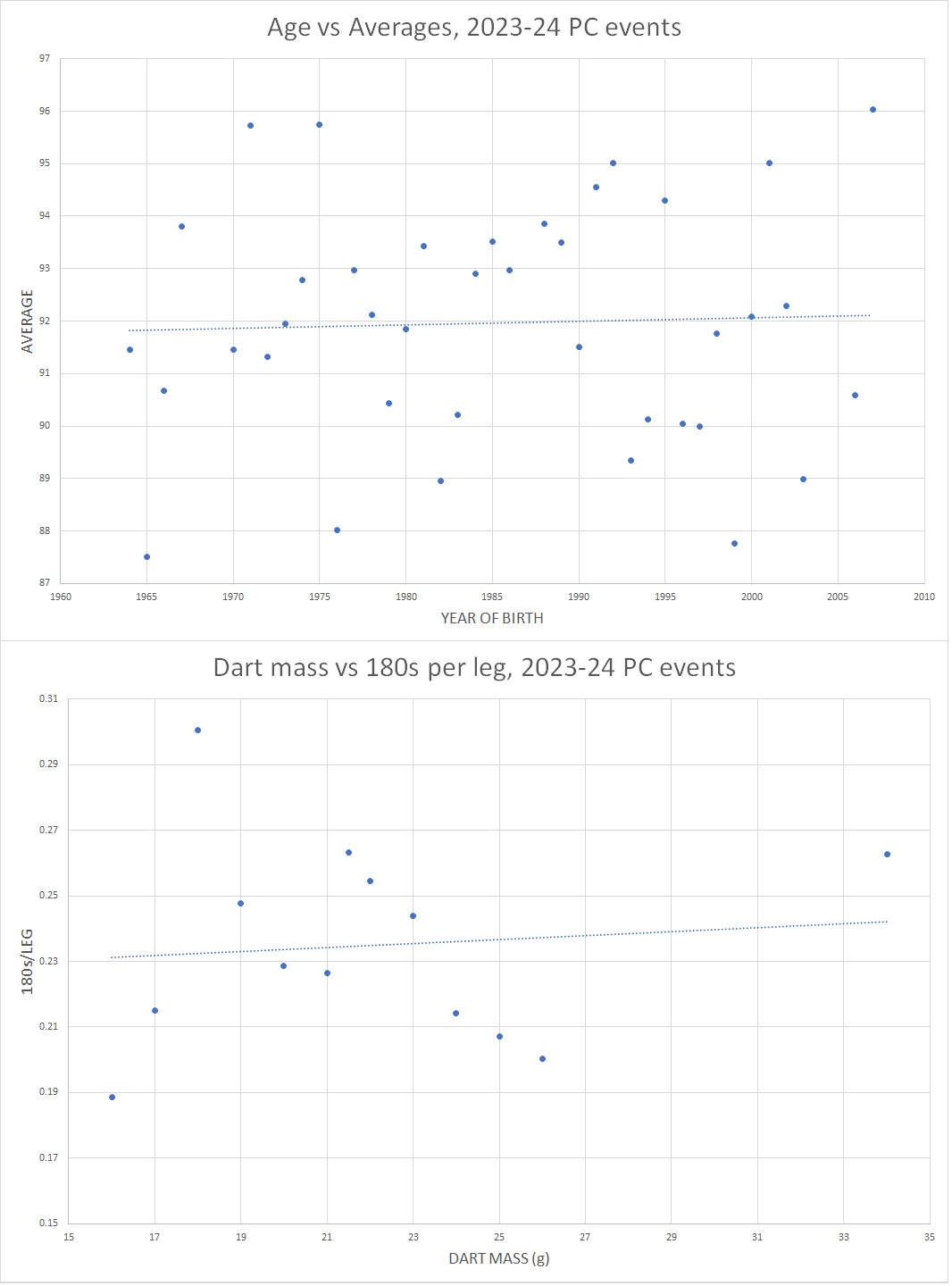
In his latest column, PDC Stats Analyst Christopher Kempf examines the different factors that contribute to player performance, including age and playing on home soil...

So many factors contribute to the outcome of a darts match, from venue temperature and humidity to the shape of the flights used by the players, that it's difficult to isolate one as the decisive factor.
Acquiring data on all these factors is an impossible task, but statistical analysis does at least allow us to exclude certain factors and silence speculation, narrowing down the list of contributors to match results in the long task of eventually identifing the critical ones.
Dart weights are, naturally, customised to the preferences and optimal performance of each player. There's no telling what factors might influence a player to choose a light or a heavy dart, but there are elite players on all points of the weight spectrum.
The most common weight among Tour Card Holders is 23g darts, but Stephen Bunting throws 18g darts and Ryan Searle, in keeping with his nickname "Heavy Metal", uses massive 32g darts.
Could there be a hidden correlation between weights? Unsurprisingly, there is no cause to believe that lighter or heavier darts lead to higher averages or more 180s.
Setting aside the problem of the minimal variation of dart weights amongst professionals - more than three quarters of Tour Card Holders throw darts within a range of only 3 grams - a model meant to isolate the impact of dart weight could only explain 1% of the variation in averages and 3% of the variation in 180s per leg.
Age could plausibly be a factor in player performance - in almost all other sports, a 20-year-old player would be expected to surpass the achievements of both a 15-year-old and those of a 50-year-old, since younger players are still developing their talents and older players are struggling against the entropy of aging.
This is not necessarily so in darts, which has witnessed both a 17-year-old reach the World Championship final and a 52-year-old win the title.
On this topic we can at least observe the performances of players representing a wide range of ages, from the aforementioned teenager Littler to the 60-year-old Steve Beaton. If there was a relationship between age and performance, we could see it.
But the conventional wisdom is correct - young players have no advantage over older players, and vice versa, solely due to their ages.
A linear model plotting two years' worth of Players Championship averages indicates a miniscule decline of 0.06 points in averages for each additional 10 years of age, with extremely low confidence that any variation in averages could be explained by such a factor.
17-year-olds and 53-year-olds have recorded nearly equivalent averages in the past two years of floor events - the likelihood that a player will average 95 or more in Players Championship events is just as high whether a player is contemplating retirement or finishing their studies.
What about the impact of 'home soil' on players' performance, especially now that several Players Championship events per year are held in Germany?
Here, at last, we have a reasonable external factor which may affect how often players win and what they average.
It makes sense that German players, who otherwise would need to fly to England and make arrangements for time off from their jobs for a multi-day trip to compete on the Players Championship circuit, would feel more at ease when only a short commute on the Autobahn would bring them to the oche.
They might even feel a sense of patriotic honour in facing foreign opponents in their own country. Surely, then, German players' performances must differ on their home ground?
The answer is, surprisingly, yes, but a negative one! German players actually have had a worse track record on their home soil than they have had in English Players Championship events.
The 13 Germans who have contested matches on the 2023 or 2024 Players Championship circuit have a combined win-loss record of 70-99 on home soil (41% win rate), with only Ricardo Pietreczko posting a winning record of 17-11 and reaching a quarter-final in a single event on German soil.
In English events, the German contingent actually win more matches than they lose (242 wins, 234 losses), and PDC veterans Martin Schindler and Gabriel Clemens join Pietreczko in having winning records.
From legs won (46.9% in Germany, 50.5% in England) to averages (89.66 in Germany, 91.64 in England), in almost every statistic, the German players perform worse on home soil.
Could it be that travelling a greater distance for a match requires a greater psychological commitment conducive to winning more matches, reversing the hypothesized causal relationship?
It's not clear - statistics can show us the correlations and the causes, but not necessarily explain them.
However, such speculation can identify new causes to investigate and helps us draw closer to that goal in the infinite distance, creating a model that can explain 100% of all match outcomes, however slowly.